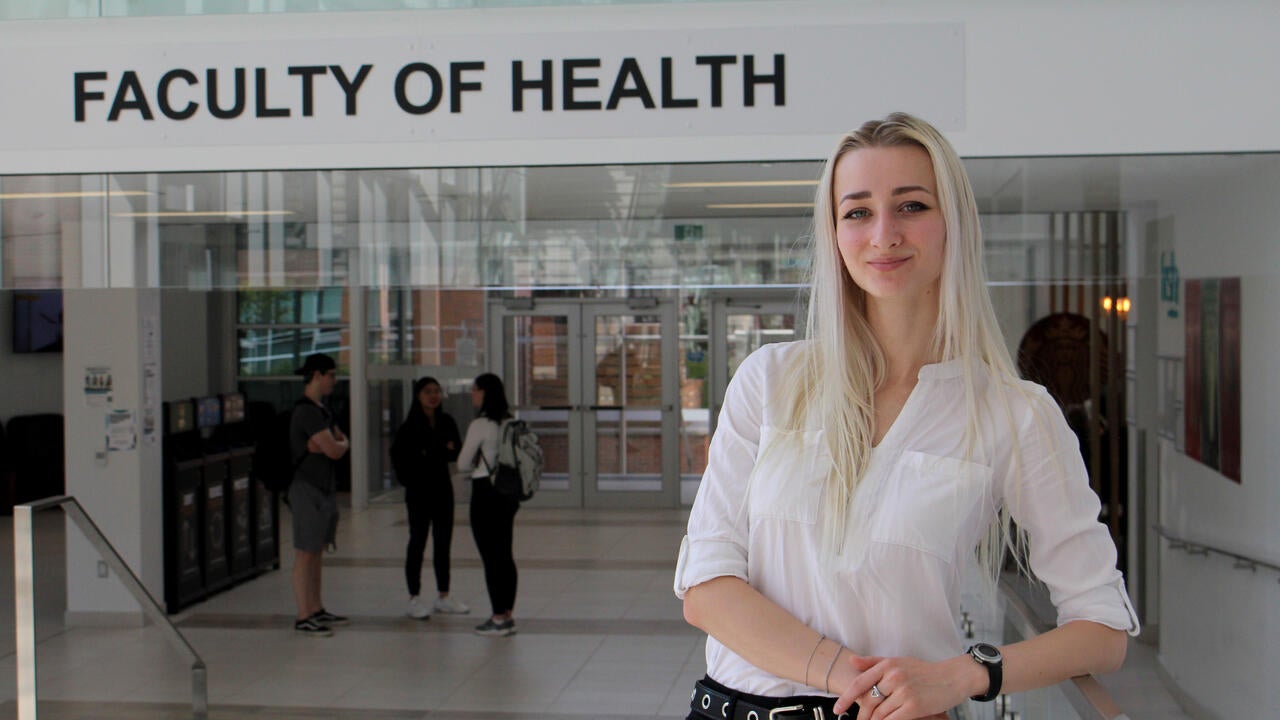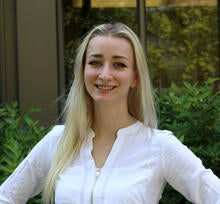
Adjusting to life in Canada
Lena Kozyr leaves Ukraine, and begins research at UWaterloo through Scholars at Risk program

Lena Kozyr leaves Ukraine, and begins research at UWaterloo through Scholars at Risk program
By Jenna Braun For the Faculty of HealthAt the beginning of last summer, master’s student Lena Kozyr fled her home in Ukraine, leaving behind parents, grandparents, relatives and friends to seek refuge in Vancouver, Canada.
Like so many other Ukrainians, Kozyr says the move was bittersweet. Though she was grateful for a sense of safety and was looking forward to new opportunities, a mix of loneliness and anxiety still riddled her.
Looking for others who share her conflicting feelings, Kozyr connected with other Ukrainian refugees in Vancouver and asked them to share their experiences in a small survey. What she found was that many of them, though they felt safe in that beautiful city, felt depressed and yearned for the life they once had.
“It appears almost all of them have mild to severe depression signs, anxiety or post-traumatic stress disorder (PTSD),” she says. “They are torn between staying in a safe place or returning home to overcome the difficulties and pressures of war.”
Wanting more answers
Feeling inspired and wanting more answers, Kozyr found Public Health Sciences Professor Peter Hall, whose area of research includes social and neurobiological influences on mental health and cognitive assessment paradigms to measure brain health and more.
 She eagerly applied to the Scholars at Risk summer program at the University of Waterloo and has since moved to Ontario to join Hall at the Prevention Neuroscience Laboratory, assisting with research that she hopes will advance her education and experience until it is safe to return to Ukraine.
She eagerly applied to the Scholars at Risk summer program at the University of Waterloo and has since moved to Ontario to join Hall at the Prevention Neuroscience Laboratory, assisting with research that she hopes will advance her education and experience until it is safe to return to Ukraine.
“It’s so interesting to me,” Kozyr says. “Because of war, so many people struggle with these issues. I met a lot of people who need support. This is a great opportunity for me to make international connections and to gain experience in public health research.”
Hall says, “My hope was to help a student in need through this program, but Lena is genuinely helping us in a very substantial way. She is focused and approaches everything with commitment, which I really appreciate.
In total, 37 Ukrainian students studying under the Scholars at Risk program across campus this summer. Describing the placement at Waterloo as a “breath of fresh air,” Kozyr says many of them say the same, telling her they’re happy to get the experience and many even hope to stay in Canada permanently.
Kozyr says life on campus so far has included swimming and volleyball at the PAC, arranging trips with the other Ukrainians to popular tourist locations in Toronto and Niagara and making the most of the warm weather. “We also share ideas, as we live on campus, and have a lot of networking events. And since we're all from different fields, we usually collaborate to bring out the best in our own projects.”
A stark contrast
It’s a stark contrast to the school life she still participates in remotely as she finishes her studies in general medicine with her Ukrainian classmates back home
“I still take classes online. Sometimes they get interrupted,” Kozyr explains. “I can hear the sirens – warning people to take shelter – and then classes get postponed until it’s safe to resume.”
Yet Kozyr remains optimistic. Her studies with Hall include a project she is passionate about, researching Transcranial Magnetic Stimulation (TMS) devices and how they may help with long COVID symptoms, concussion diagnoses and PTSD.
She explains that people are “not as open” about mental health struggles in Ukraine, and notes that after what so many of them have experienced, it’s important to her to seek out solutions that could help those with PTSD.
“Most people have had something in their life that they’ve lost,” she says, “but you can’t be at the same point that you used to be when there is a big change. It takes time. To find a new job, to make new friends, to adjust to the culture.”
When asked what she might say to other refugees going through a similar experience, Kozyr says she’d tell them not to be too hard on themselves, that it gets easier and that people are out there who will help you.
“Do your best and remember that you’re just a human being. We all need time to work things out.”

Read more
Displaced Ukrainian students get a second chance at post-secondary education thanks to UWaterloo summer school program

Read more
Iranians and Ukrainians join forces on the University of Waterloo campus to fight for democracy

Read more
The internship includes various academic research, hands-on lab tours, and workshops focusing on artificial intelligence
The University of Waterloo acknowledges that much of our work takes place on the traditional territory of the Neutral, Anishinaabeg, and Haudenosaunee peoples. Our main campus is situated on the Haldimand Tract, the land granted to the Six Nations that includes six miles on each side of the Grand River. Our active work toward reconciliation takes place across our campuses through research, learning, teaching, and community building, and is co-ordinated within the Office of Indigenous Relations.